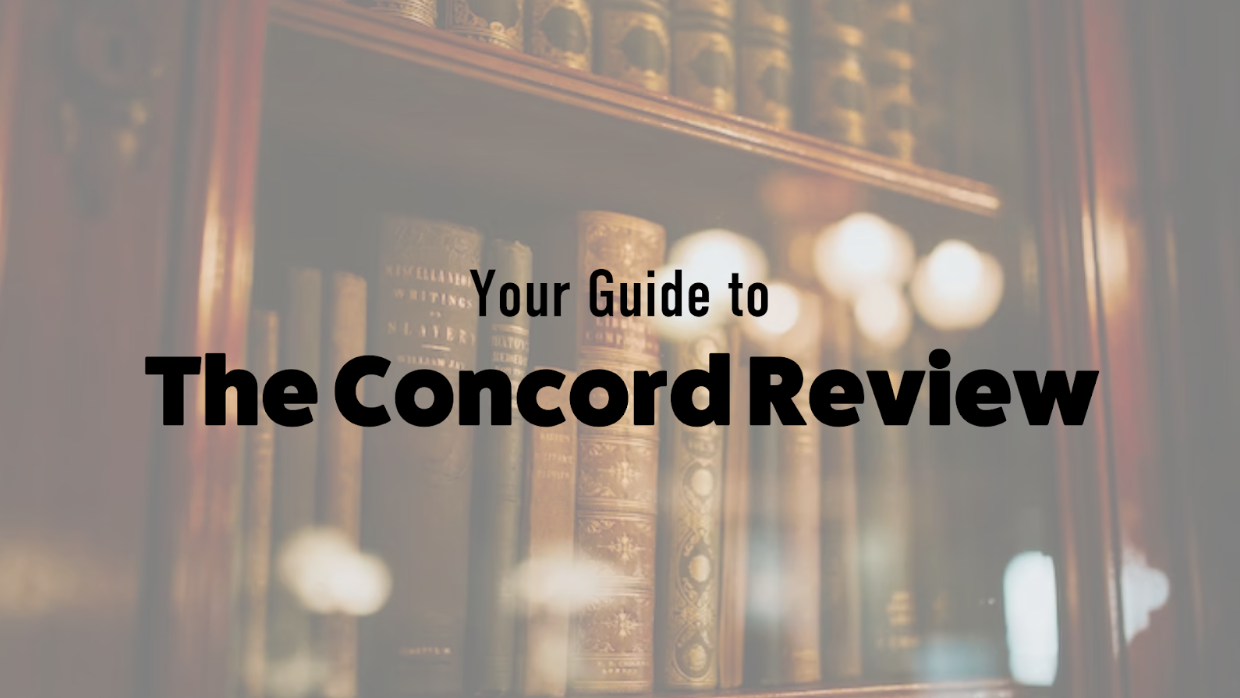Your Guide to The Concord Review
The Concord Review is the most prestigious and competitive journal publishing work from high school students in history. Their belief in the pursuit of academic excellence in secondary schools has driven them to recognize and publish exemplary history papers from high school students worldwide. Even having an essay published in The Concord Review is considered outstanding by admissions committees at many of these institutions.
Publishers in The Concord Review hail from forty-two states and thirty-nine countries and have gone on to attend Brown, Columbia, Cornell, University of Chicago, Harvard, Oxford, Yale, Dartmouth, Princeton, Cambridge, Caltech, MIT, Carnegie Mellon, McGill, Johns Hopkins, and many more prestigious institutions. Read on to learn more about this quarterly journal for academic history papers, the Emerson Prize, and National Writing Board.
Submitting to The Concord Review
The Concord Review is looking for history research papers on any historical topic, ancient or modern, domestic or foreign. The goal is simply to develop a long-form research paper, averaging 8,500 words with endnotes and a bibliography. Its prestige comes from its extreme selectivity – its acceptance rate is currently less than 5%. The papers they accept are of the highest quality and indicate significant time invested and exceptional writing quality.
The primary requirements for The Concord Review applicants are:
You must have written the paper while in high school
You must be the sole author, though the research can be done with a mentor
The paper must be in English
The paper should be at least 5,000-7,000 words
Essays can be on any topic related to history
Essays should have notes and a bibliography (Chicago Style)
Essays should not include charts, photos, graphs or other graphics
Papers should be submitted online here on a rolling basis. The deadlines for each issue are August 1 (Winter), November 1 (Spring), February 1 (Summer), and May 1 (Fall), and your submission will automatically be considered for the following four issues.
To apply to The Concord Review, you will need to pay a submission fee, which will allow you to access the next four issues of the journal. The fee will be $70 (USD) to access the electronic version of the journal. To access the print version, the fee will be $110 for applicants in the US and $150 for international applicants. You will pay online via Paypal and can only submit a check at the address here if you live in Singapore.
The Concord Review publishes approximately 5% of the papers they receive. If your paper will be published in the next issue, you will receive a letter the month before the issue comes out. If you have any questions about the submission process, email membership@tcr.org.
The Concord Review’s National Writing Board
One of the Special Programs of The Concord Review is the National Writing Board, an assessment service for history research papers. Senior secondary instructors will review your research paper and write a three- or four-page report, which you can read and choose to forward to admissions committees of different colleges. This evaluation service has been endorsed by 39 colleges and is considered highly reputable among admissions officers.
The Concord Review’s Emerson Prize
This prize is awarded annually to students who have published in The Concord Review and show outstanding promise in history at the high school level. It has been awarded to over 200 students since 1995, and recent awardees have gone on to Harvard, Middlebury, Stanford, Brown, Yale, Princeton, and NYU.
3 Tips to Craft a Manuscript For The Concord Review That Stands Out
Develop a Strong Central Thesis
The Concord Review will be looking for a paper with a clear central focus. For all research papers, your thesis should be specific, arguable, evidence-based, and clearly stated. It should identify your research topic and the purpose of your essay. You will know it is not specific if you find your paper wandering – your thesis should act as a blueprint as you write your manuscript. To determine if it is arguable, see if it is possible to argue against it.
Read Some Examples
Read as many published works as possible. Both academic papers about your topic and papers published in The Concord Review. By reviewing relevant literature, you will gain some clarity on the current state of research and new perspectives that you can incorporate into your work. You will need to write around 5,000 words, so the more you have to draw from, the better off you are. And by reading works that have been published in The Concord Review, you will get a sense of the depth and writing style they are looking for.
Clarity and Concision are Key
Because of the importance of depth and critical analysis in The Concord Review, your writing should be crystal clear. This means that your editing process should be devoted to making your language concise and straightforward. Every sentence should advance your argument and flow from one to another. As a rule of thumb, shorten any sentence that runs longer than a couple of lines, and split any paragraph spanning more than half a page.
Bonus Tip: Find a Mentor
Mentors are crucial to the research process; they push your thinking and provide guidance and perspective as you complete your work. Mentors could range from teachers to professors at local academic institutions to those found in 1:1 mentor matching programs.
If you are interested in applying to The Concord Review, consider applying to the 1:1 Mentorship Program at InspiritAI! Artificial Intelligence is becoming increasingly more prevalent in historical research, and our mentors – hailing from the world's top research institutions and tech companies – will walk you through an entire research project from start to end. Whether you are a coding novice or a virtuoso, our individualized mentorship program will help you develop an exceptional computational and historical research project. For more information, do not hesitate to contact InspiritAI with questions.




